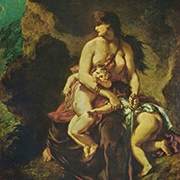Georg Benda’s “Ariadne” and “Medea” stand right at the beginning of the emerging genre of melodrama. The late version of “Medea” has now been published in the “OPERA” series and provides the basis for an intense theatrical experience.
The classical myth of Medea, one of the most fascinating female figures of all, has remained alive and a source of inspiration to the present day – for example, in magnificent films by Pier Paolo Pasolini and Lars von Trier, in Christa Wolf’s novel Medea. Stimmen and Aribert Reimann’s Medea opera of 2010. The subject of Medea was present on the operatic stage throughout Europe from the beginnings of opera history.
One of the greatest successes in German music theatre of the late 18th century was Georg Benda’s Medea (1775). The work, after a text by Friedrich Wilhelm Gotter, was performed for decades throughout central Europe and is regarded as a masterwork in the genre of “monodrama” or “melodrama”. Unlike in opera, spoken, rather than sung text was combined with orchestral music and scenery; the traditional formal language of opera (aria, recitative, ensemble, chorus) were replaced by a new combination of music, scenery and language. As a result the music followed the text and the psychodramatic course more closely than was possible in opera or Singspiel of the time. The concentration on a single main character and the fast, graceful interplay between spoken text and music enabled psychograms full of conflict and contradictions to develop with a new kind of intensity. The form of melodrama (ultimately harking back to Rousseau) thereby created a highly irregular ferment in the heart of the classical period of theatre.
Benda’s work allows the classical figure of Medea to come to life, almost without any external plot, in the intense, intractable conflict of her emotions alone: love and hate, rage and grief, memories of happiness and transgressions, deep-rooted desires for revenge and motherly love, fears and hopes, despair and revolt succeed each other rapidly within her – to a catastrophic intensification with the murder of her children. All these emotions find their intense expression in the varied landscape of emotions found in Benda’s music, which cast its spell over generations of audiences. No lesser a person than Mozart profoundly admired this work for it. Benda structured Medea as a virtuoso piece for Friederike Sophie Seyler, the most famous German actress of her day; even today the 50-minute work can still reveal its exceptional expressive power when a great actress knows how to bring it to life.
At the end of his life Benda revised Medea extensively once more, in the process drawing on the sum of his practical experience with the theatrical effect of the work. This late version is in many respects more effective. Premiered in 1784 in Mannheim, it has remained unknown until now and is once again available in the Bärenreiter edition for the first time. The alterations which Benda made for the new version are far-reaching and affect almost every bar: many details of the music writing have been revised (tempi, part-writing, rhythm, accompanying figures, etc.), the orchestration has been considerably altered, the middle parts are more lively, and all in all the music has been shortened and effectively condensed. Benda noted at the beginning of the manuscript in 1784: “Medea / with / improved music […] / I wish I had brought it to the theatre in this form / right at its birth.” So the composer himself regarded this later, considerably altered version as the valid version of the work. However, because of Benda’s resignation from the music business it no longer featured in the repertoire of theatres and remains completely unknown to this day: all previous editions of the work – and therefore all existing recordings – are based on the early version of 1775. The new edition now invites the rediscovery of this masterpiece of music theatre in its final form for the first time.
Jörg Krämer
(from [t]akte 1/2018)



